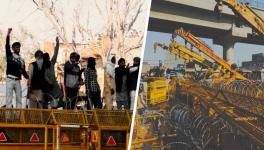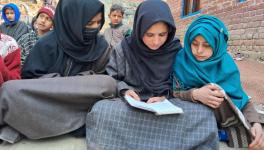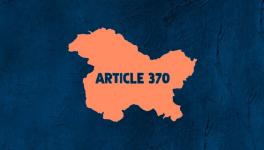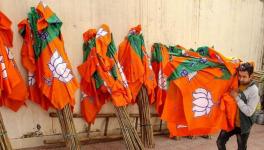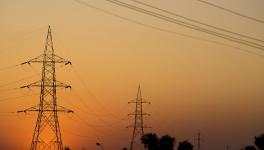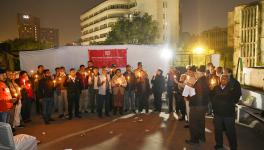Kashmir: Amid Communication Lockdown, Media Distrust at All Time High
Over two months have passed since a total lockdown was imposed on Jammu and Kashmir, shutting down telephone lines, internet and virtually, the entire media in the state, following the abrogation of Article 370. The scale and magnitude of media production has severely come down. Yesterday, on October 3, over 300 journalists of the state staged a protest at the Kashmir Press Club demanding an immediate end to the blockade, terming it as an attempt to muzzle their voices. Along with the lockdown imposing a serious hindrance to the freedom and working of local media, there is also a widespread media distrust among the residents of the Valley.
“We are terrorised by the forces. If we speak up now, they might turn up in our houses a few hours later or a few days later and punish all of us.” said the father of a 17-year-old teenager who allegedly swallowed poison to avoid torture by the forces in South Kashmir’s Shopian region. Explaining the fears, a relative added, “We may speak the truth but the national media is showing complete lies. They are showing that everything is normal, when nothing is. They are not showing the truth of lives and fabricating lies.”
Several cases of irresponsible reporting have surfaced too. Speaking to NewsClick, several residents alleged that in many cases the identities of those speaking to the media and the details of the location were not kept private by media outlets. As a result, not just the families—who are already reeling with cases of torture and detentions of their family members—but even the communities in which these families live have been forced to pay the price for speaking the truth.
Also read: Journalists Hold Protest Against Communication Blockade in Kashmir
A local journalist working for a weekly said, “The scale of production has come down. We are all sitting idle in the Press Club. Initially, when the lockdown had just started we used to pass handwritten notes to keep each other in the loop, and now emails are being circulated. Journalism was never easy in Kashmir, but what we are witnessing now is unprecedented.”
A female photojournalist at the Press Club added, “People are very conscious of the media. They check our IDs and take pictures of the IDs primarily because of the fear of repercussions.” Another journalist, sharing his experience, said, “I had gone to a house where the forces had done enormous damage, however, people refused to speak to me. People were not as scared earlier, but now that feeling has set in. They are scared of grave consequences, which is why the extent of the crackdown remains severely underreported.”
Residents have also shared testimonies of police officers posing as journalists and extracting information from them and later returning to punish the community. Adnan (name changed) from Telbal said, “Some police officers and BJP members had come here posing as mediapersons. Following that we have made it a point to take pictures of IDs of the journalists we speak to. Since we don’t have access to the internet or TV, we do not know how our stories are being shown. Some narratives by television channels such as The Republic have shown normalcy, they have also spewed venom about us and our land, we can’t take that.”
Allegedly, in some areas those with cable connections have taken off channels such as The Republic and Times Now over the celebration of the revocation of Article 370 in their reports.
On the ground, the international press enjoys greater credibility and access from the locals for sharing their stories. Recently, BBC found itself in a spot after the government called its reportage on the excesses committed by the state “baseless”. The organisation later presented documented accounts to back its report which had to be then accepted by the government.
Also read: Newspapers in Kashmir Trapped by Restrictions, No Word from Reporters
The popularity of the BBC Radio bulletin is leading many residents to now go back to radio. Speaking to NewsClick, a BBC journalist on the condition of anonymity, said, “People are now buying radio sets in bulk to access the BBC bulletin, which has been extended to an hour everyday. This is what people had to resort to back in the 90s as well, amid the tensions in the state then.” He added, “Their credibility is increasing because people want to see an impartial analysis where one can read between the lines and go beyond the partiality of both India and Pakistan.”
Journalists are also facing gruesome forms of harassment and violence at the hands of the forces.
Earlier this month, Shahid Khan was among six other journalists who were brutally thrashed by the forces for covering the Muharram procession in Srinagar, which led to serious injuries on his hand and his back. But Shahid is not the only journalist to have faced violence recently. On August 14, Irfan Ahmad Malik, who works for Greater Kashmir, was picked up by security forces from his residence in Tral town of Pulwama district during a midnight raid. He was detained at the local police station and released after two days. The police, however, didn’t specify the grounds on which Malik was arrested.
Earlier in September, a photojournalist from Anantnag district was picked up by forces and detained at an Army and Special Operations Group camp in Kulgam for five days. The scribe, who works with a Jammu-based daily, was released on September 16. Again, there was no word from the security forces about the charges against the photojournalist.
Get the latest reports & analysis with people's perspective on Protests, movements & deep analytical videos, discussions of the current affairs in your Telegram app. Subscribe to NewsClick's Telegram channel & get Real-Time updates on stories, as they get published on our website.









